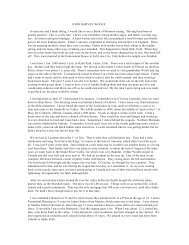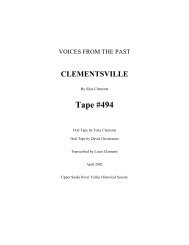HelPeR - BYU Idaho Special Collections and Family History
HelPeR - BYU Idaho Special Collections and Family History
HelPeR - BYU Idaho Special Collections and Family History
You also want an ePaper? Increase the reach of your titles
YUMPU automatically turns print PDFs into web optimized ePapers that Google loves.
On the Bookshelf<br />
incorporated into the Army<br />
of the Potomac <strong>and</strong> joined<br />
the First Brigade, Second Division,<br />
Ninth Corps. They<br />
would fight with this unit<br />
from the horrors of Fredericksburg<br />
to the garrison of<br />
Fort Hell before Petersburg.<br />
Along the way, the regiment<br />
fought engagements in Mississippi<br />
<strong>and</strong> Kentucky <strong>and</strong><br />
would return to Virginia in<br />
1864. Here the men from the<br />
Seventh Rhode Isl<strong>and</strong> Volunteers would face constant<br />
danger from Spotsylvania to the North Anna,<br />
Mechanicsville, Cold Harbor, Petersburg, <strong>and</strong> Poplar<br />
Spring Church. One of the ten companies in that regiment<br />
was Company K. Found in collections throughout<br />
Rhode Isl<strong>and</strong> these transcribed <strong>and</strong> edited letters<br />
tell of a community of men at war. Here are the vivid<br />
accounts of battles <strong>and</strong> leaders, of fatiguing marches,<br />
<strong>and</strong> horrible illness as the men recorded it in letters<br />
home to their families. These letters reflect a critical<br />
moment in this nation’s history as these farmers<br />
<strong>and</strong> mill workers turned their backs from home <strong>and</strong><br />
went south to fight in the Civil War. Carefully preserved<br />
through the generations these letters allow<br />
the veterans of the Seventh Rhode Isl<strong>and</strong> to speak.<br />
From these simple words, penned on faded pieces<br />
of paper the past is brought to life. These letters are<br />
presented to the reader exactly as the soldier wrote<br />
them, along with historical narrative, identification<br />
of those mentioned in the text, a roster, images, <strong>and</strong><br />
bibliographical notes.<br />
The Civil War in TEXAS <strong>and</strong><br />
the SOUTHWEST<br />
By Colonel USA (Ret) Roy F.<br />
Sullivan; 2008; 5.5x8.5; 150<br />
pp; softbound. Order from<br />
the publisher at: Heritage<br />
Books, Inc., 100 Railroad<br />
Ave., Suite 104, Westminster,<br />
MD 21157; Phone 800-<br />
876-6103; Fax 410-871-2674<br />
or www.heritagebooks.com;<br />
S4370; ISBN: 0788443704;<br />
$19.00 plus $7.00 p&h.<br />
“The contributions of the<br />
Texas Navy to the Republic<br />
(of Texas) were more important than contemporaries<br />
understood. During the critical first months of revolution,<br />
the Navy fought off blockaders, interrupted<br />
Mexican supply lines, <strong>and</strong> provided the opportunity<br />
for victory at San Jacinto. Later, aided by American<br />
<strong>and</strong> French quarrels with Mexico, it prevented a seaborne<br />
or sea-supported attack of Texas. And finally,<br />
in 1843 the Navy thwarted a well-organized full scale<br />
invasion of Yucatan which, if successful, would have<br />
led inevitably to reinvasion, possibly reconquest of<br />
Texas.” Many people have never heard of the Republic<br />
of Texas, nor know that the “Lone Star State” was<br />
its own nation for ten years after winning independence<br />
from Santa Ana at San Jacinto. Texans were<br />
on their own, struggling to create a new republic in<br />
the mold (<strong>and</strong> shadow) of the United States. A navy<br />
was needed—a strong <strong>and</strong> feisty one—to defend 600<br />
miles of Texas Gulf coast from a strong <strong>and</strong> aggressive<br />
Mexico which wanted Texas back. To defend themselves<br />
Texans had three navies. The Impromptu Navy<br />
was a collection of hearty individuals <strong>and</strong> small craft<br />
curbing Mexico’s harsh authority along the coast. The<br />
First Navy blockaded Mexican ports, seized shipping<br />
carrying arms <strong>and</strong> munitions to Mexican armies <strong>and</strong><br />
reduced Mexico’s powerful navy to an escort role.<br />
The Second (<strong>and</strong> last) Texas Navy’s sailing ships confronted<br />
Mexico’s state-of-the-art warships, defeated<br />
them, preventing Mexico’s blockade of its rebellious<br />
Yucatan <strong>and</strong> Tabasco provinces while forcing Santa<br />
Ana to an armistice with Texas.<br />
Abe Lincoln Afloat<br />
By J. C. Ladenheim; 2008;<br />
5.5x8.5; 82 pp; softbound.<br />
Order from the publisher at:<br />
Heritage Books, Inc., 100 Railroad<br />
Ave., Suite 104, Westminster,<br />
MD 21157; Phone<br />
800-876-6103; Fax 410-871-2674<br />
or www.heritagebooks.com;<br />
L4558; ISBN: 0788445588;<br />
$13.50 plus $7.00 p&h.<br />
In 1828, Abe Lincoln, a<br />
gangling 18-year old Hoosier<br />
farm boy, made the first of<br />
two 2,500 mile journeys down <strong>and</strong> up the Mississippi<br />
River, which he undertook at no small risk to<br />
life <strong>and</strong> limb. The youth marveled at the hazards of<br />
navigation, the strange plants <strong>and</strong> animal life, the<br />
crime <strong>and</strong> bustling commerce encountered along the<br />
great river <strong>and</strong> the slave plantations emerging from<br />
the wilderness. He visited a great city, heard foreign<br />
languages spoken, saw foreign flags, <strong>and</strong> watched in<br />
distress as men <strong>and</strong> women were sold off by pitiless<br />
auctioneers. He returned home by steamboat, realizing<br />
every boy’s prayers, <strong>and</strong> thereafter held himself<br />
out as an experienced river man. The author, a retired<br />
neurosurgeon, has been a lifelong Lincoln student<br />
Ja n ua ry/Fe b r u a r y 2009 Ev e r t o n’s Ge n e a l o g i c a l He l p e r © 131














